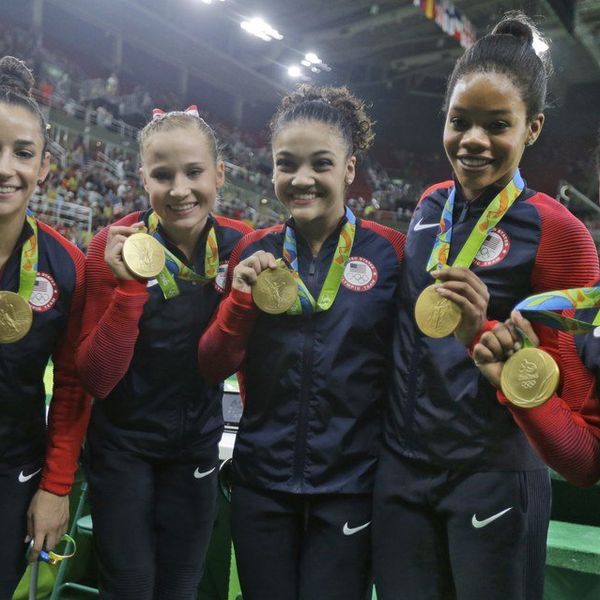A couple weeks ago I was sitting in a café, enjoying the best vegan ice cream known to humanity, when I couldn’t help, but hear the conversation at the next table. A group of four people at least in their late 20's were talking about everyone’s favorite summer topic: the Olympics. Great, right? Sure. As they talked about the various Olympics trials that had taken place, the topic of performance enhancing drugs came up and I tuned out. Until, of course, I heard the magic word: gymnastics — the only I sport I care about outside of the Olympics and definitely my favorite summer Olympic event. Amidst the discussion of whether gymnasts use these drugs, one woman commented on the fact that many elite gymnasts these days are really built. “Remember when these were little girls? And now look at them,” she said condescendingly as her male friend agreed and proceeded to comment on how they were too ripped.
OK, let’s ignore for a second that the ‘thin little girls’ these people referred to were the product of abusive coaching practices — that they were often overworked and tormented for gaining weight, and that many national and Olympic champions of the past several decades have come forward to disclose the mental scars their training left them with. Let’s focus instead on the fact that they are athletes and that they train in one of the most physically demanding sports in existence.
Next, let’s discuss the fact that the gymnasts who made the U.S. Olympic team are between 15 and 22-years-old. If you’re a 30-year-old man, then you have no place commenting on young girls bodies. End of story. Even if they’re athletes. Even if they’re in the public eye. Even if our society has taught you that it’s OK to shame women’s bodies and sexualize young girls. As someone who hasn’t yet exited her teen years, I can tell you that teenage girls are harder on themselves than anyone else ever could be. The absolute last thing they need are grown men commenting on their physical appearances.
A photo posted by USA Gymnastics (@usagym) on
<script async defer src="//platform.instagram.com/en_US/embeds.js"></script>
In a world with dress codes and Internet photos that sexualize, shame and shame young girls' perception of body imagine, there is a certain appeal to women’s gymnastics. Unlike the demeaning, sexualized way many women’s sports are discussed, women’s gymnastics celebrates young women as legitimate athletes and acknowledges the physical and mental strength the sport requires. Simone Biles is heralded for her strength and skill, rather than her body type or pandering to female beauty standards. And yeah, she wears gorgeous leotards and her makeup is always on point, but she does these things while flawlessly executing a superhuman sport with strength and grace.
The conversation I overheard in the café came mere days after I’d read the Teen Vogue cover story on Gabby Douglas. She discussed, among other things, the horde of negative online comments about her body following her success at the London Olympics and the toll it took on her confidence and training. It broke my heart to hear that someone I so greatly admire had felt that kind of pain—and it made me furious that it was instigated by other people. And while the guy in the café may not have been one of the people to insult Gabby online in 2012, coming face-to-face with the kind of person who feels those comments are acceptable shook me.
A photo posted by Gabby Douglas (@gabbycvdouglas) on
<script async defer src="//platform.instagram.com/en_US/embeds.js"></script>
In the time that I’ve been reflecting on this overheard conversation, I’ve noticed more people on the internet rising to attack another gymnast: McKayla Maroney, member of the 2012 Olympics’ Fierce Five. McKayla continued her gymnastics training until very recently, having dedicated nearly twenty years of her life to the sport. Just as being a gymnast means certain things for your body, quitting gymnastics means certain other things. And McKayla has had to endure people’s opinions on this, from comments on her figure to speculation on lip injections. Our culture is so acclimated to the Kardashians and other celebrities who inarguably undergo plastic surgery that people are so quick to pin these practices on 20-year-old ex-athletes.
A photo posted by McKayla Maroney (@mckaylamaroney) on
<script async defer src="//platform.instagram.com/en_US/embeds.js"></script>
I’ve struggled with my own body image since I was 10-years-old, and I’ve spent a lot of time on unhealthy tracks to remedy these thoughts. Part of my appreciation for gymnastics lies in my admiration of the many girls my age (and even younger) who are steadfastly dedicated to their sport and their physical health. Gymnastics, and the young women who keep it alive, have inspired me to live my own life in healthier and more forgiving way. They are, and should be, praised for their fitness, strength, grace and dedication. They are athletes and they are role models and I am, in no way, shape or form, here to listen to anyone who criticizes their bodies.





















